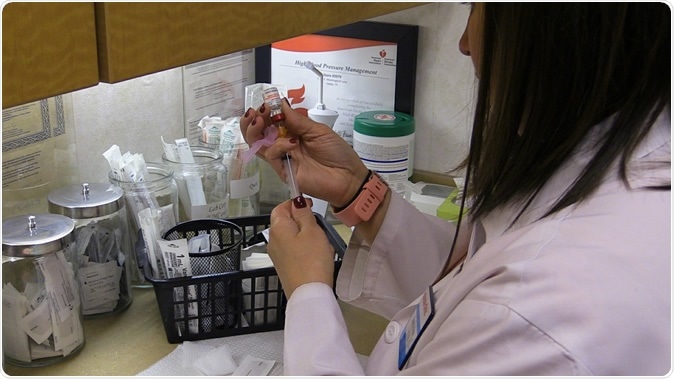New research has revealed that older adults who regularly golf could be at a lower risk of death compared to those who do not play. The results of this research are to be presented at the American Stroke Association's International Stroke Conference 2020 in Los Angeles between the 19th and 21st of February 2020.
The researchers explain that over 25 million Americans play golf, and there are numerous benefits provided by this sport, including regular exercise and reduction of anxiety and stress. Many older adults play golf and prefer it over other, more strenuous sports. The social aspect of the game is another big draw for older adults. The game can be played by the elderly and even by those who have had a heart attack or a stroke explain the researchers. This is one of the greatest advantages of this game, they write.

Nurse preparing to administer shingles vaccine. Image Credit: American Heart Association
This new research shows that golf could help in a reduction in the risk of death among these older adults. Lead author Dr. Adnan Qureshi, executive director of the Zeenat Qureshi Stroke Institutes and professor of neurology at the University of Missouri in Columbia, Missouri, said, "Our study is perhaps the first of its kind to evaluate the long-term health benefits of golf, particularly one of the most popular sports among older people in many countries." He added, "The U.S. Department of Health and Human Services Physical Activity Guidelines for Americans does not yet include golf in the list of recommended physical activities. Therefore, we are hopeful our research findings could help to expand the options for adults to include golf."
For this study, the team included data from the Cardiovascular Health Study that includes 5,900 older adults aged 65 years and above and looks at the risks of heart disease and strokes in them. The participants were followed between 1989 and 1999 and monitored every six months for over 10 years. Even after the study ended, these participants were regularly contacted over the phone to check up on their health, and any incidence of strokes or heart attacks were recorded. Of the participants, those that played golf at least once in a month were considered to be golfers.
The study included 5,900 older adults of an average age of 72 years. There were 384 regular golfers among the study population, and of these, 41.9 percent were men. The participants were all followed up, and during this period, there were 8.1 percent and 9.8 percent strokes and heart attacks respectively among the golfers. The risk of deaths among golfers and non-golfers showed that there was a 15.1 percent risk of death among golfers compared to 24.6 percent death risk among non-golfers.
Qureshi explained, "While walking and low-intensity jogging may be comparable exercise, they lack the competitive excitement of golf. Regular exercise, exposure to a less polluted environment and social interactions provided by golf are all positive for health. Another positive is that older adults can continue to play golf, unlike other more strenuous sports such as football, boxing, and tennis. Additional positive aspects are stress relief and relaxation, which golf appears better suited for than other sports."
At present, the team is looking at the direct impact of this sport on the risk of heart attacks and strokes in cohorts or large populations. They are analyzing the health parameters that could influence the effects of golf on overall health and the risk of death. The team said that their aim would also be to stratify if the golfers were walking down the course or taking the golf carts and the exact amount of exercise they were getting and its relationship with the risk of deaths.
According to the Centres for Disease Prevention and Control (CDC), 7.8 million adults have had a stroke once in their lives, and this makes up for 3.1 percent of the total population. Similarly, one person dies of heart disease every 37 seconds in the United States, and one in four deaths is due to heart disease, says the CDC. Every year around 805,000 Americans suffer from a heart attack, and it still remains one of the largest killers. Atherosclerosis, high blood pressure, high cholesterol, diabetes, obesity, and other heart disease markers remain the top risk factors for stroke and heart attacks.
According to the American Heart Association (AHA), lack of regular physical activities is associated with 250,000 deaths each year, and lack of physical activity remains one of the five greatest risk factors for cardiovascular disease. Regular exercise leads to a reduction in body weight, reduction in high blood pressure, reduction in bad or LDL cholesterol, as well as total cholesterol, improvement in good or HDL cholesterol, and improvement in insulin sensitivity, says the AHA.
Source:
Shingles vaccine may also reduce stroke risk / American Stroke Association International Stroke Conference – Poster Presentation TP493 - https://newsroom.heart.org/news/shingles-vaccine-may-also-reduce-stroke-risk?preview=8bf6